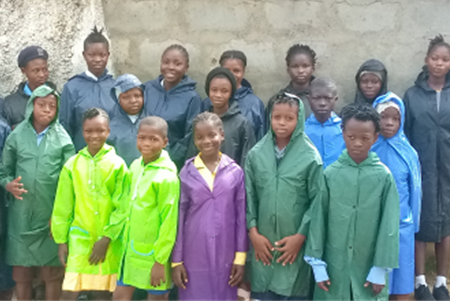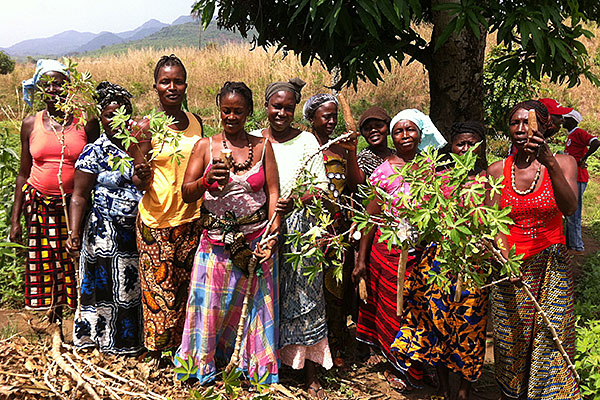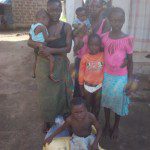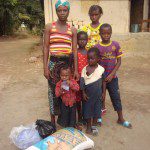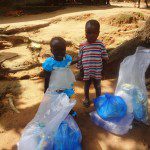EBOLA : Help for Child Victims
- Quarantined Families
- Quarantined Families
- Food Distribution to orphans by our partners BOB.
Most of the children in Sierra Leone are affected directly or indirectly by the Ebola epidemic: at best, no child has been to school or college since July. And in a population which is very young, with 50% under 19yrs, there are now many thousands of children living at home with their families who are going hungry, simply due to the breakdown in the economy, and the failure of farming and food supplies.
There are also many children who have lost parents or carers and now have to fend for themselves. ‘The Ebola virus has deprived many homes in the community, it has left many children homeless, hopeless, and deprived, without parents or guardians that will take care of their welfare. Now some of these victims barely get enough food to survive, while others go to bed hungry’ wrote a community leader.
Thanks to your donations and our hard-working team in Waterloo, the Waterloo Partnership charity is continuing to supply quarantined families with basic food supplies, bottled water and charcoal for cooking, as directed by the Government’s Emergency Response Centre. This body co-ordinates the distribution of supplies to the 500 or so quarantined families in the town – not all of them supported by WP. These families will normally include several children, and will have witnessed the death of a relative in the home, or else have an infected relative in a treatment centre. If someone else becomes ill or dies from Ebola during the 21 day isolation period, the process has to start again, and more food is supplied. Meanwhile the children are confined to the home, with a high risk of becoming infected themselves.
Particularly tragic is the predicament of children who have been found unsupervised at home after their parents have died, when because of the overwhelming fear of infection, they have not been cared for by neighbours or extended family. All Ebola orphans should be in quarantine, but the older children from these homes often run away and live rough, while potentially infectious and in need of medical care. The chair of WPSL, Alieu Badara Mansaray, tells us: ‘Some are housed by sympathetic guardians, while the majority roam the streets searching for food and sleep under the market stalls at night. People are afraid to interact with them, because of the fear of them carrying Ebola. The problem of orphans is monumental’.
Sadly the Waterloo Partnership does not have the resources to look after this special group of children; but we are now providing extra food for the 40 vulnerable children in our ‘uniforms’ scheme, for whom we have a duty of care. Fortunately none of these children have lost parents or ‘guardians’ to Ebola; and the few left behind when their foster parents moved away from Waterloo during the epidemic have been taken in by friendly neighbours. However, all families are struggling to feed their own children, let alone an extra foster child. There is no work for ‘petty traders’, while food is scarce, and prices are rocketing.
Mrs Aminata Mansaray, wife of our Chair, who has supervised the scheme for a number of years, and knows many children in the community, has identified another group of 20 who are particularly vulnerable at present. Some have been abandoned by parents or relatives; a few stay with temporary guardians; while others spend time with sympathetic neighbours, or do odd jobs in return for
‘a small meal’. Some sleep out in the open, a target for mosquitos, under stalls or on verandas.
With extra funding from the WP charity, Aminata and her team are now feeding all 60 children twice a week, providing bottled water, bread, sardines, sugar, milk powder, biscuits and ‘gari’ (cassava). Supplies are delivered by car to children who are not within walking distance.
Food distribution is not without problems and heartache: a personal eyewitness account from Aminata describes the difficulties. ‘Some of the 20 orphans share part of their food items with other unfortunate children who stand by when distribution occurs. Some of these children share with the children and adults who provide shelter for them. It is difficult for them to keep all the foodstuffs for themselves, that’s why I gave a little extra during the last distribution. Some children come to collect supplies, and as they leave other vulnerable kids follow them to ask for some food. For every new food distribution, more children come and look enviously as the lucky ones collect their packages. Pathetic indeed, but we cannot help’.
Please help us to go on feeding children in Waterloo, Sierra Leone, hungry victims of Ebola.
